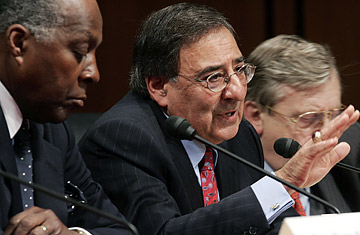
Iraq Study Group member and former White House chief of staff Leon Panetta speaks during a news conference in Washington on Dec. 6, 2006
Leon Panetta may not have an intelligence background, but his appointment as CIA director shows that Barack Obama understands the CIA's problems. As a former White House chief of staff, Clinton Administration budget director and eight-term California Congressman, Panetta knows his way around Washington better than most people, and that kind of knowledge is exactly what the CIA needs right now.
Panetta is experienced enough to understand that the CIA was the victim of political manipulation under the Bush Administration. It was the Bush White House that cherry-picked the intelligence on Iraq, not the CIA. Panetta will have the ear of the new President to walk him through all of this and to make the case that there is no point in throwing out the baby with the bathwater. Panetta will also serve as a good counterweight to retired Admiral Dennis Blair, the designated director of national intelligence who is unlikely to streamline the intelligence community or challenge the Pentagon's preeminent position.
The CIA will need Panetta to hold off the Senate and House intelligence committees, which are gearing up to rip into the CIA for the past eight years of renditions, secret prisons and bad intelligence on Iraq. Mistakes aside, the last thing the CIA needs is another round of overly intrusive congressional hearings like those that so badly damaged the agency in the 1970s. If today's Congress were to deliver a coup de grâce to the CIA, the Pentagon would effectively be the nation's only intelligence agency.
Panetta's service with the Iraq Study Group will serve him well. Aside from Afghanistan, how and when the U.S. pulls out of Iraq are the most pressing intelligence and foreign policy issues that the new Administration will face in the next two years. There is no time for a CIA director to play catch-up.
Leading Democrats on the Senate Intelligence Committee Jay Rockefeller and Dianne Feinstein have already criticized the choice of Panetta, claiming the CIA needs to be led by an experienced intelligence professional. But right now, political clout and the ability to be a strong advocate for the CIA far outweigh the virtues of being a professional spy and knowing the difference between a "live drop" and a "dead drop." A professional from the ranks would be eaten up by Hillary Clinton at State or Bob Gates at Defense. Or he or she would end up like Bill Clinton's CIA director, Jim Woolsey, who was shut out of the White House, ignored, and became irrelevant.
I've noticed that Tim Weiner's book Legacy of Ashes has become a report card for the CIA, a final and damning indictment. But what the lay reader might miss is that, while Legacy of Ashes catalogs the failed covert operations and finished intelligence manipulated by the White House — in other words, the politicization of the CIA — it fails to acknowledge the agency's successes. There's more than enough truth in Weiner's book, but what it misses is the point that when the CIA is left to the basics, it does just fine, thank you.
In spite of the past eight years, the CIA is an institution we don't want to, and shouldn't, give up on. The rank and file in the CIA understand that they need an advocate in the White House, just as the agency needs someone who is able to tell the President no. The only question now is whether Panetta will have the portfolio to do what is absolutely necessary: move the CIA out of Washington and away from politicians, get the CIA out of covert action once and for all, and pay CIA employees what they deserve for the hard work demanded of them.
Robert Baer, a former CIA field officer assigned to the Middle East, is TIME.com's intelligence columnist and the author of See No Evil and, most recently, Blow the House Down
